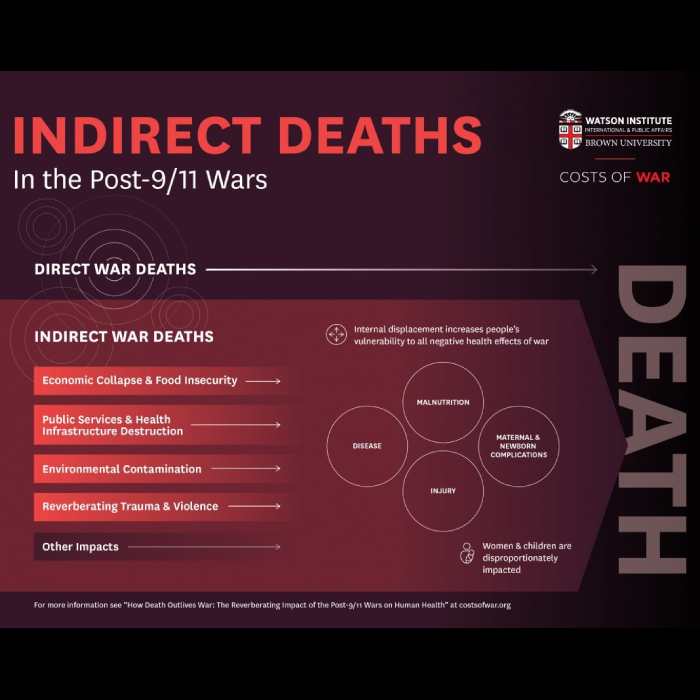Report by Will Porter.
The far-reaching effects of America’s War on Terror may have contributed to the deaths of some 4.5 million people, according to new research by Brown University’s ‘Costs of War’ project. While many of the fatalities were the direct result of violent conflict, indirect causes such as economic collapse and food insecurity have taken a far greater toll.
Published on Monday, the study examines the long-term impact of the “post-9/11 wars” and the “devastating indirect toll” inflicted in Afghanistan, Iraq, Pakistan, Syria, Yemen, Libya and Somalia – all nations subject to US military intervention since 2001.
“Some of these people were killed in the fighting, but far more, especially children, have been killed by the reverberating effects of war, such as the spread of disease,” the paper said. “These latter indirect deaths – estimated at 3.6-3.7 million – and related health problems have resulted from the post-9/11 wars’ destruction of economies, public services, and the environment.”
Though the researchers acknowledged that the true total figure remains unknown, the study reviews a wide range of factors contributing to mortality. Those include economic collapse and the resulting loss of livelihood for local residents, the destruction of health infrastructure and public services, environmental contamination, as well as other cultural effects of war that can lead to further violence down the line.
“While this research does not ascribe blame to any single warring party or factor, and neither does it suggest the full death count is quantifiable, a reasonable and conservative estimate suggests that at least 4.5 million people have died in the major post-9/11 war zones,” the study concluded.
It went on to stress that “body counts are complicated and controversial,” and that tallying deaths from indirect causes is even more difficult, suggesting its figures are merely a tentative estimate based on a variety of sources.
The researchers found staggering levels of child malnutrition in some of the affected countries, with Afghanistan and Yemen topping the list. In the wake of Washington’s two-decade military occupation, more than 3 million Afghan children are now experiencing wasting, a symptom of severe, potentially life-threatening malnutrition.
Last year, Doctors Without Borders warned of a “worrying increase” in Afghanistan’s malnutrition rates, citing “the suspension of international aid” as among the primary causes. A special representative for the United Nations, Dr. Ramiz Alakbarov, described the situation as “almost inconceivable,” adding that up to 95 percent of Afghans were “not eating enough food, with that percentage rising to almost 100 percent for female-headed households.”
UN emergency aid coordinator Martin Griffiths has also attributed the crisis in Afghanistan, in part, to international sanctions and the seizure of government bank accounts following the Taliban’s sudden rise to power in the summer of 2021.
The study found that more than 2 million children in Yemen were also suffering from wasting following eight years of brutal bombings by Saudi Arabia and its allies, which have all but crippled the country’s healthcare sector. Riyadh has received indispensable support from the United States throughout the conflict despite countless reports of attacks on civilians and infrastructure, including hospitals, clinics, homes, factories, farms and bridges. A UN estimate in late 2021 suggested some 377,000 people had been killed in Yemen since the war erupted in 2015, with 70 percent thought to be children under the age of 5.
The Costs of War authors said the study aimed to “convey the scale of the suffering” in the war-torn nations, stating the “urgent need to mitigate the damage” inflicted by US military interventions and their long-term and indirect consequences. They added that additional research is needed on the subject, voicing hopes such work could “prevent further loss of life,” as America’s post-9/11 wars “are ongoing for millions around the world who are living with and dying from their effects.”
Will Porter is assistant news editor at the Libertarian Institute and a staff writer and editor at RT. Find more of his work at Antiwar.com and Consortium News.
Source: The Libertarian Institute. 17 May 2023
